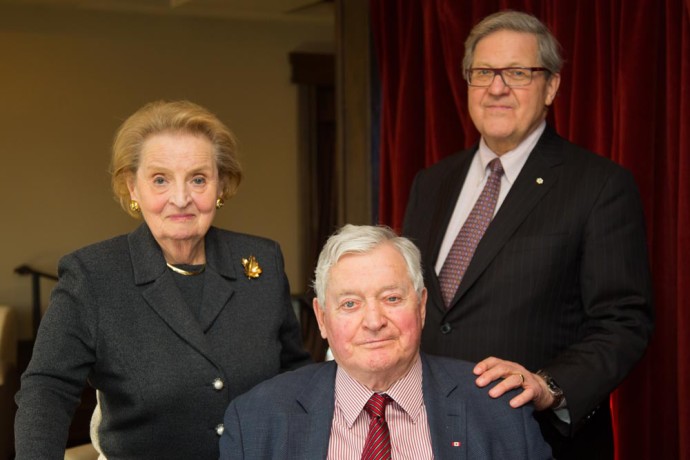April 24, 2014
Albright, Axworthy urge more multi-lateral involvement
By Andrew Cardozo
From The Hill Times

The Global Progress Evening was hosted by the Canadian Centre, providing an opportunity for two major international figures to share their thoughts and advice about current and recent world affairs.
Earlier in the evening we heard from two Ontario ministers Eric Hoskins (Minister of Economic Development, Trade and Employment) and Yasir Naqvi (Minister of Community Safety and Correctional Services). Mr Hoskins spoke of his longstanding rapport with Lloyd Axworthy when he was a Senior Advisor to the Foreign Affairs Minister and addressed the role that the Canadian Centre needed to play in developing good public policy. Mr. Naqvi brought greetings from Ontario Premier Kathleen Wynne.
The Ontario Co-Chair for the federal Liberal campaign, Navdeep Bains also spoke about the importance of the event and the Centre and brought greetings from Federal Liberal Leader Justin Trudeau.
The co-chairs of the evening were former Foreign Affairs Ministers Barbara McDougall (Progressive Conservative 1991-1993) and Bill Graham (Liberal 2000-2003). Both talked about the importance of dialogue on foreign affairs and welcomed the keynote speakers.
The moderator for the keynote conversation was Althia Raj, Ottawa Bureau Chief, Huffington Post Canada.
Madeleine Albright and Lloyd Axworthy were American and Canadian counterparts during the Clinton and Chrétien administrations—two administrations that had a good relationship that was close and cooperative. They are politicos of an earlier time. They have the benefit of wisdom gained at the highest offices of their countries, and the freedom to think and speak without political constraints. But they are popular because their thoughts are sharp, focused, and progressive.
They moved on from politics but stayed active in global affairs locally and internationally. Albright is professor at Georgetown University. Axworthy is president of the University of Winnipeg. They are both active in, among other things, the Aspen Institute, an organization that brings together many former foreign affairs ministers to address world affairs. And these folks are no closeted ivory tower savants.
Their views are sharp and bold, and, in their post-political lives, they have remained close friends and colleagues, who almost finish each other’s sentences. But they also have enormous respect for each other. So seeing them together in a conversation at the Global Progress Evening, hosted by the Canadian Centre for Progressive Policy was a special treat for a politically aware crowd in Toronto on April 1.
They are passionate multilateralists and are regularly called on to advise, address, and monitor world events. They were both active in the development of the bold policy of R2P—the responsibility to protect, which means sometimes requiring the good guys of the world to intervene in the affairs of sovereign countries to protect citizens. These are foreign ministers who were at the height of their power during the dark days of the dreadful wars in the Balkans and central Africa. They are racked with thoughts about what they and their international counterparts could have done to save lives, had a whole lot of other things been done differently by world powers. And what is particularly good about their commitment to humanity is that they want the world to learn the lessons about what to do and what not to do as evil raises its head in various corners of the world.
They were also leaders in creating the International Criminal Court and the Ottawa Treaty on Landmines, which Axworthy led worldwide.
While bold, Albright is not flippant. She rejects the suggestion that Russian President Vladimir Putin can be compared to Hitler (incidentally a comparison made by Foreign Affairs Minister John Baird), reminding one that the Holocaust was not comparable to Putin’s record. She nevertheless does not spare Putin. She is severely critical of him, charging that he lives in a “parallel universe” and creates his own facts.
Like her, Axworthy is concerned that the world is too complacent about Russia’s expansionist plans while recognizing the limited toolbox available to Western governments who do want to push back.
While in Canada, Albright studiously avoided speaking about the Conservative government’s foreign policy, which also suggested she is not totally enamoured with it. But she did point to Canada’s history of being active citizens of the world, something that is needed more.
She noted that the relationships between leaders and ambassadors at the United Nations, where she was U.S. ambassador during the first Clinton administration, was crucial to make things happen. Progressive governments need to use these forums more to find solutions, whether at the formal meetings or in the corridors.
These two politicians were in office more than a decade ago, but their reputations have only grown since then, as they have entered their roles as citizens of the world in the best sense of the word. Their advice and cautions are so worth listening to in this world that just keeps getting more complicated, confrontational and dangerous.
Their presence drew many notables. Others in the audience included former prime minister John Turner, former ministers Don Macdonald, Maria Minna, Sandra Pupatello, Navdeep Bains, former Liberal leader Bob Rae and former MP John English.
Many students were drawn to the event including Amara Gutierrez, who recently returned from a Canada World Youth stint in Ukraine, and asked what young people in Ukraine needed to be doing. Go beyond the Maidan, Albright told her, get involved in grassroots movements across the country.
Andrew Cardozo is a regular columnist at the Hill Times and is president of the Canadian Centre for Progressive Policy.



